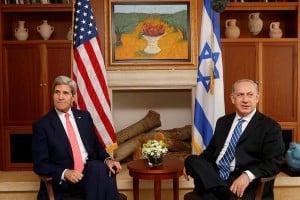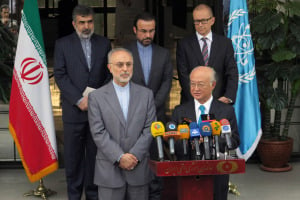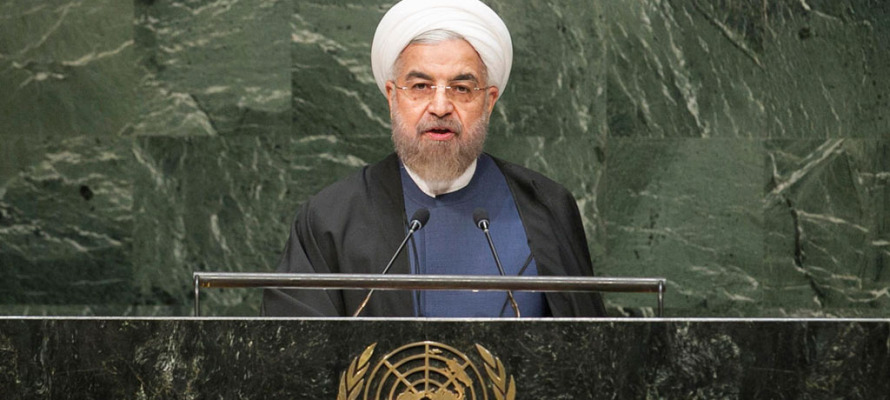At least two people are dead following an explosion Sunday at or near a suspected Iranian nuclear facility.
An explosion in the vicinity of the Parchin military compound near Tehran lit up the night sky on Sunday, shattering windows and setting fire to trees in nearby villages, according to Sahamnews, a pro-Iranian-reform website.
The explosion caused a large fire in an “explosive materials production unit,” the semi-official Iranian Students News Agency (Isna) reported.
Iranian officials have denied that the explosion occurred, telling Isna that two people were missing after “an ordinary fire” broke out due to “chemical reactions of flammable material” at an unidentified location.
Inspectors Denied Access
Experts with the International Atomic Energy Agency (IAEA), the United Nation’s nuclear watchdog, have long suspected that Iran is using the Parchin complex to conduct research, including explosive experiments, as part of its drive to achieve nuclear weapons capability. Iran maintains that its nuclear ambitions are peaceful, yet it has refused since 2005 to give IAEA inspectors access to the site.
Negotiations between Iran and the P5+1 countries (the US, UK, France, Germany, China and Russia) have been stalled since this summer over Iran’s refusal to cooperate with the IAEA. In a letter sent to US Secretary of State John Kerry on Oct. 1, 354 members of the US House of Representatives expressed their deep concern and urged him to monitor the situation closely.
Iran Won’t Cooperate
“As you know, the IAEA has sought information on the ‘potential military dimensions’ of the Iranian nuclear program, in particular information about Iran’s extensive research and development of a nuclear explosive device,” the letter stated.

US Secretary of State Kerry and Israeli PM Netanyahu (Photo: Miriam Alster/Flash90)
“For several years, the IAEA has attempted to work with Iran to resolve this central issue, but Tehran has refused. Last November, the IAEA and Iran concluded a ‘Framework for Cooperation’ in which Iran agreed to work with the IAEA, including by providing satisfactory information in response to IAEA inquiries within mutually agreed deadlines. Nevertheless, in its September 5, 2014 report, the IAEA stated that Iran had failed to meet its latest deadline, even as it continued to demolish structures and construct others at the Parchin military base, where clandestine nuclear-related activities have reportedly taken place.”
The letter concluded, “An agreement that effectively prevents Iran from acquiring a nuclear weapons capability demands transparency on the extensive research and development that Iran has undertaken in the past.”
‘World’s Most Dangerous State’
Israeli Intelligence Minister Yuval Steinitz issued a warning last month about implosion tests that were being conducted at Parchin.
“It is important to emphasize that these kinds of tests can have no ‘dual use’ explanation, since the only possible purpose of such internal neutron sources is to ignite the nuclear chain reaction in nuclear weapons,” Steinitz said in a statement issued the day before Iranian President Hassan Rouhani addressed the United Nations General Assembly.

Dr. Ali Akbar Salehi, VP and Chairman, Atomic Energy Organization of Iran (l) with Yukiya Amano, director general, IAEA (r) in Iran, Aug. 2014. (Photo: IAEA)
In his address, Rouhani claimed that Iran had, over the past year, “engaged in the most transparent dialogue to build confidence regarding Iran’s peaceful nuclear program.”
Iran is “the world’s most dangerous state in the world’s most dangerous region,” intent on obtaining “the world’s most dangerous weapons,” Israeli Prime Minister Benjamin Netanyahu told the UN General Assembly last month. Iran is engaged in a “manipulative charm offensive… designed for one purpose, and for one purpose only: To lift the sanctions and remove the obstacles to Iran’s path to the bomb.”
Author: Joanne Hill
Staff Writer, United with Israel
